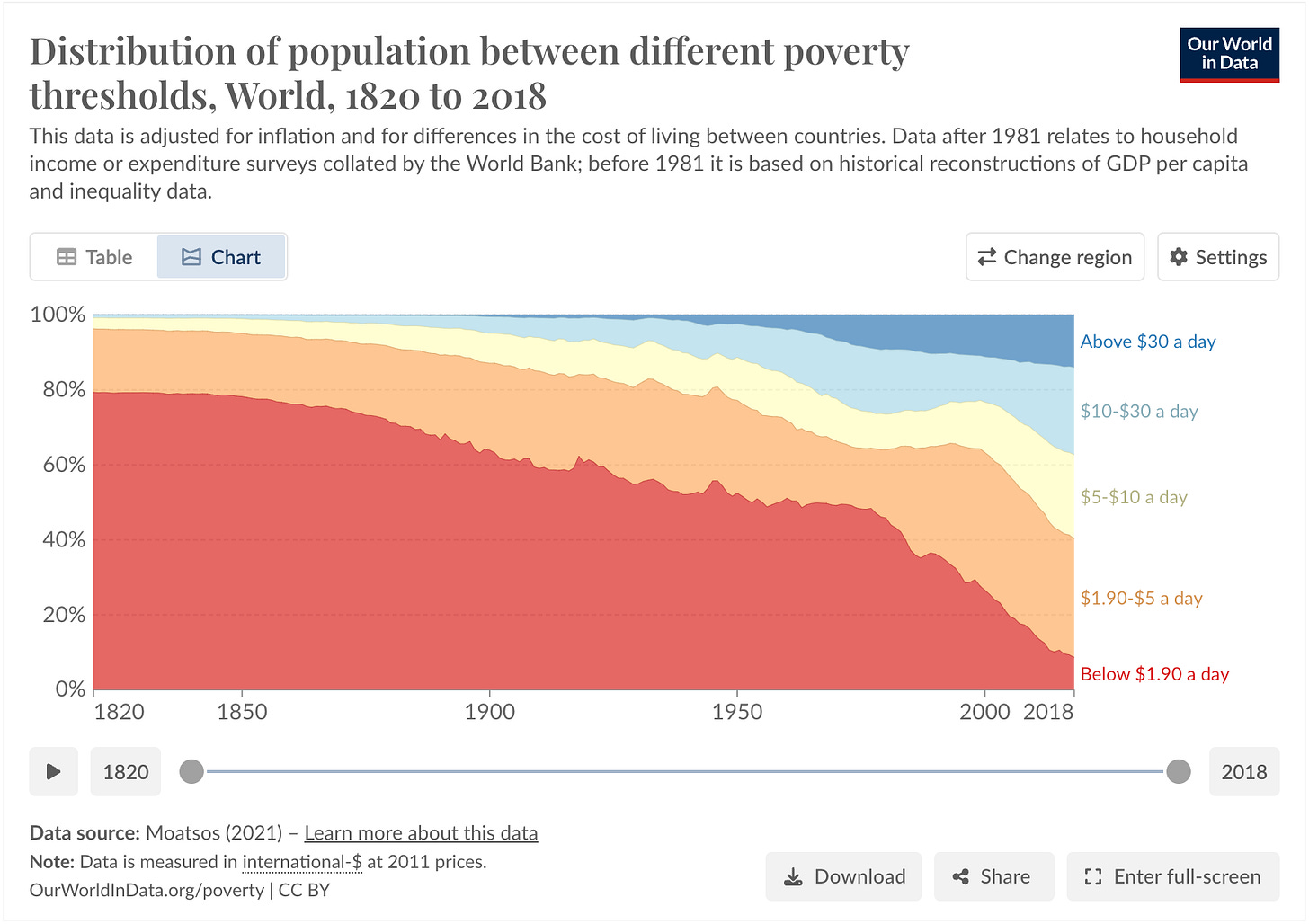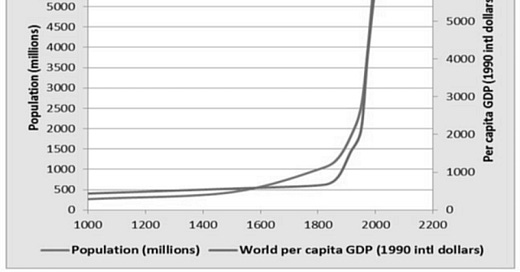Throughout most of human history, we struggled to survive.
Now, we live in a time of unprecedented abundance.
Thanks to scientific discovery, technological innovation, and economic growth, we live longer, healthier, and wealthier lives.
But despite being ostensibly better off than any generation before us (at least in terms of material prosperity), why does it feel like we’re still struggling?
We’ve won the lottery, historically speaking.
Even those regarded as “poor” in modern times have access to conveniences and luxuries that kings and queens of the Middle Ages couldn’t have imagined.
Do we realize how good we’ve got it?
We are healthier and wealthier than our ancestors
The graph below shows the world population and per capita GDP from 1000 AD to 2001.

You’ll notice a sharp increase in both population and per capita GDP shortly after 1800.
Why did that happen?
Giarini and Jacobs explain:
“The increasing welfare and human security generated by the two industrial revolutions account for the most rapid expansion in population and living standards the world has ever witnessed, as shown in [the graph above]. This marriage of science, technology, organization and finance reached full maturity after World War II and was primarily responsible for the 25 years of continuously high rates of growth in most industrialized and industrializing countries.”
This video shows a data visualization to demonstrate the global increase in health (life expectancy) and wealth (income per person) from 1810 to 2009.
There are differences between individual countries, but on average, the global population is much healthier and wealthier, compared to 200 years ago.
For more data on historical improvements in education, literacy, child mortality, freedom, energy access, clean water, sanitation, hunger, internet access, human rights, and more—check out Our World In Data. This post (history of global living conditions) is a good place to start.
Modern “poor” live better than royalty 200+ years ago
Here is a description of America’s “poor” in a 2020 report from The Heritage Foundation:
“According to the government’s own data, the average American family or single person, identified as poor by the Census Bureau, lives in an air-conditioned, centrally heated house or apartment that is in good repair and not overcrowded. They have a car or truck. (Indeed, 43% of poor families own two or more cars.)
The home has at least one widescreen TV connected to cable, satellite, or a streaming service, a computer or tablet with internet connection, and a smartphone. (Some 82% of poor families have one or more smartphones.)
By their own report, the average poor family had enough food to eat throughout the prior year. No family member went hungry for even a single day due to a lack of money for food.
They have health insurance (either public or private) and were able to get all ‘necessary medical care and prescription medication’ when needed.”
Read more about how the Census Bureau measures poverty.
It seems that our understanding of poverty is relative.
We refer to those as “poor” who are worse off than others in the same time period, but are they poor compared to their ancestors who lived in past periods of human history?
The data shows that all classes of society have grown significantly wealthier over the past couple of centuries.
And this isn’t just the U.S. There’s less poverty globally …

Do we realize how good we’ve got it?
61% of Americans are living paycheck to paycheck.
71% say the country is headed in the wrong direction.
Generally, it feels like there’s a lot of pessimism.
And again, it’s not just the U.S.
A 2016 survey asked people in 17 countries, “All things considered, do you think the world is getting better or worse, or neither getting better nor worse?”
58% of respondents thought that the world is getting worse.
It seems that we don’t realize how good we’ve got it.
The data shows that we’re much better off now, compared to the rest of human history.
But we don’t seem to feel as though that’s the case.
Where’s the disconnect?
We are healthier and wealthier than ever before.
Shouldn’t we consider ourselves lucky to have been born in an era of such abundance?
Wouldn’t you expect more gratitude and joy?
Instead, we seem to be struggling for continued progress and fixating on the bad instead of the good.
You don’t know what you’ve got until it’s gone
A few months ago, I found a lump in the side of my neck.
I went to the hospital earlier this week and the doctor said it’s most likely just a swollen lymph node.
Before I went to the doctor, I was worrying. What if it’s a tumor? What if I have cancer?
As I was having these worries, I noticed that my daily life got a little brighter. I was more thankful for the small things. The fear triggered by even the slightest possibility of losing my life forced me to be grateful for things that I usually take for granted.
This happens to me often. When I get sick, I realize I was taking my health for granted. When I’m away from my girlfriend, absence makes my heart grow fonder.
What if we could experience something similar to this on a global level? Something that would make us realize how much we have to lose, how good we’ve got it.
Don’t Look Up was a movie released in 2021.
Here’s the plot summary:
“Two low-level astronomers must go on a giant media tour to warn humankind of an approaching comet that will destroy planet Earth.”
DiCaprio’s character says a line at the very end of the movie that has been resonating in my head, kinda haunting me:
“We really did have everything, didn’t we?”
Here’s the ending scene:




The data shows that we’re much better off now, compared to the rest of human history.
But we don’t seem to feel as though that’s the case.
Where’s the disconnect?
>The data you cited shows that physiologically and financially the trends have been “up and to the right”, but implicit in your argument is an assumption that those metrics correlate to a “better” human experience. I think this is the disconnect - materialism is the new religion and by all accounts that religion is “making things better”, at least when you add up how much money is spent
but that ignores the reality of lived experience, which includes emotional and psychological considerations that (in my opinion) are more essential to having a “good life” than anything material
so perhaps the disconnect is not with the data and reality, but rather with our societal ideas about that makes a life worth living
My guess is that you have a good-paying job and live comfortably. Only someone who's never known poverty could write an article like this.
The reality is that the rich get richer and the poor get poorer. And if you're at one end of the spectrum, it's hard to see the other end.
Consider this: "In the second quarter of 2023, 69 percent of the total wealth in the United States was owned by the top 10 percent of earners. In comparison, the lowest 50 percent of earners only owned 2.5 percent of the total wealth."
https://www.statista.com/statistics/203961/wealth-distribution-for-the-us/
I'm assuming you're in the US... Full disclosure: I'm not--I live in France, but I've lived in the States a couple of times, visit often, have many friends there, and watch American news, so I am somewhat informed on the topic.
One thing that struck me the last time I was in Denver (2018) was the number of people living in the streets. I'd never seen that in the past--not in the States, anyway, and not in the suburbs of a big city like that. In particular, I remember a white middle-class family (I say 'white' to stress that it's not just minorities who are affected) who was living under a bridge near a freeway.
I doubt homeless folks like that would agree that "we live in a time of unprecedented abundance."
Heck, I doubt my brother would have agreed. He lived in the States for four decades and things only got worse over the years, despite never being unemployed (he even started his own business). In the end, he had to juggle THREE jobs to make ends meet and still couldn't afford rent (he lived in his storage unit) let alone health care. He was single, so imagine if he'd had a family, how much worse it would have been.
On a side note, he owned a smartphone and a computer. You'd argue that means he wasn't poor. Sorry to break it to you, but that doesn't prove a damn thing. Without a phone or a computer, he wouldn't have been able to work. Without work, he'd have been even worse off. There are choices you have to make when your budget is tight, and sometimes those choices involve getting some technological device that will make your life easier rather than a healthy meal and trade the latter with cheap cans.
You ask "Where’s the disconnect?"
A good starting point would be to look at how wages have stagnated for years while the cost of living has gone up. Middle class families used to live comfortably, while now they are getting dragged down toward poverty.
https://www.epi.org/publication/charting-wage-stagnation/
Another reason why people are so pessimistic is because of climate change. How can you claim we are living in a world of abundance when Earth's population reached (in 2005!) the point where it started consuming more than what the planet could produce?
https://www.theguardian.com/science/2005/mar/30/environment.research
In 2022, all the resources Earth can produce in a year had been consumed by August 2. This 'overshoot day' keeps coming earlier each year. Source for this is a respected French newspaper (the text is paywalled, but enough of it is free to get a sense of what they're saying):
https://www.lemonde.fr/en/environment/article/2023/08/02/earth-overshoot-day-as-of-august-2-humanity-enters-ecological-debt_6076116_114.html
If you question the reliability of these sources, check out this BBC article that explains where those numbers come from and how they are calculated. It even includes criticism of the process, so you know it's not one-sided. It's still interesting and gives much food for thought IMHO.
https://www.bbc.com/news/magazine-33133712
Oh, I know what you're thinking: you don't lack for anything, so how can we be consuming all the resources? It's a question of availability. Take gold, for instance. We know there's not a lot of it, right? That's why it's so valuable. But who has the gold? Me? You? I suppose you could have a little bit if you put some money into it. But that's my point. You need to be able to afford it. The rarer something becomes, the more expensive it gets, and then only the wealthiest can access it.
So while everything might still look normal to you, I'd bet you anything that third world countries are having a VERY different experience.
I'll grant you it's not a black and white thing. There are many gray areas and it's a very very complicated matter. But it's way too easy to talk of "unprecedented abundance" if you live in comfort without considering the growing misery around you.